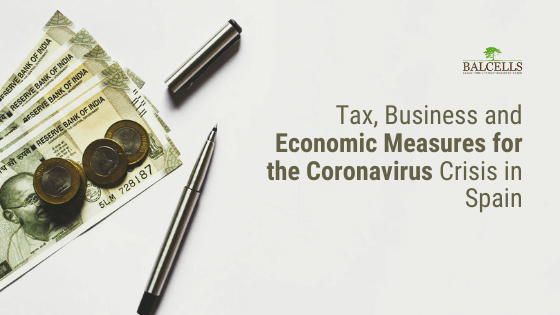The current coronavirus crisis is producing a tremendous impact on the Spanish economy. Many companies are downsizing, and many freelancers are struggling to even earn half the income they obtained during a prior normal month. That is why the Spanish government has implemented special business and tax measures to palliate the effects of coronavirus. In this article, we will explore all those economic policies. So make sure to pay close attention, you may be able to benefit from them!
Nearly 20.000 infected individuals. And the number does not stop growing. The current Covid-19 crisis that Spain and many other countries in the world are suffering is having is not just a health-related issue. It is also having a huge impact on the economy and to all of the agents that form it.
Ibex 35 is falling drastically. But that seems a common trend, as many other stock indexes, like S&P, are also plummeting. That is a great indicator of which are the market expectations towards the current situation and how it will behave in the near future.
But there is no need to look at expectations. The situation in the Spanish labor market is really complicated right now.
On the one hand, we find both big and small companies completely struggling. They are being forced to fire an important part of their employees, both temporarily and indefinitely. That is why the government approved the possibility of doing an ERTE: temporarily laying off workers until the situation improves.
On the other hand, we also find another key group which is suffering immensely: self-employed workers. Some of them can work from home. But others, like painters of plumbers, can’t. And the math is simple: if they can’t work, they can’t earn any income. But they still have expenses. The result? Bankruptcy.
This unprecedented situation has forced the Spanish government to act and implement drastic tax and business measures. That is what we are going to talk about in this article.
Let’s review the main economic changes that the government has created in order to help companies and freelancers thrive during the coronavirus crisis.
Tax payment deferral: How to postpone your tax payment due to Covid-19
Under the dispositions of the RD 7/2020, a specific group of taxpayers can request the extension or deferral of their tax payment obligations during the coronavirus crisis.
More precisely, the concrete group of individuals who can benefit from this economic measure can differ that payment for a maximum of 6 months.
Bear in mind that both companies and autónomos (freelancers or self-employed individuals) can benefit from this initiative.
You will be given 6 months of deferral (counting from the last day in which the official deadline is over). Out of those 6 months, the first 3 won’t have interest rates applied.
For the last 3, if you use them, you will pay 3.75%, the annual interest rate on late payments.
Under which circumstances can you defer your tax payment?
In order to be eligible for this disposition, you must meet the two following conditions:
- The debt or payment you are about to defer must be under 30.000€
- The incomes you generated must be under 6.010.121,04 €
Of course, even if you fit under this category, you can choose not to opt for it. Adhering to this measure is completely optional.
Which are the taxes that can be deferred?
This Royal Decree-Law allows the postponement of debts that under normal conditions would not be postponed. We are talking about the withholding of VAT (value-added tax), personal income tax and fractional payments of Corporation Tax.
So, more specifically, you can postpone all the tax payments that correspond to the 1st quarter of 2020, which are:
- Your quarter VAT return
- Your payment into account of both Personal Income tax (IRPF) and of Corporate tax (IS)
- And, finally, rental income, interest income and Personal Income Tax Withholdings on Employment and Professionals income
In order for this to be effective, you need to present a specific form requesting the deferral. Failing to realize this request will imply not complying with the law, so you will be penalized.
As with any Spanish administration, the Spanish Tax authorities’ offices are closed. Hence, you must formalize your request online.
You must visit the tax agency’s website where you will find specific instructions in regards to what to include in the specific form to benefit from this measure.
If you need personalized assistance from our tax lawyers, we are at your complete disposal at info@balcellsgroup.com. We will manage the deferral application for you.
What happens if my electronic certificate has expired?
The recently created Royal Decree also tackles this issue.
If your electronic certificate, the same you used for filing your taxes, has expired, there is no problem. Of course, with the current situation, you cannot renew it.
Therefore, you are still allowed to present your taxes with it. Even though it has expired or will do so soon.
Be careful: you still have to file your taxes on time
The tax agency has clearly stated that you must still present all the payments and corresponding taxes on their official due date.
You still have to present the 720 model, your VAT quarter file, etc.
If you don’t fall under any of the beforementioned cases or you don’t want to use this extension/deferral, you still need to submit all the documents on time and realize the corresponding payments.
Tax processes extension until the 30th of April
Any kind process you were obliged to realize with the tax agency, like inspections, debt payments, existing deferred payments or allegations will be postponed.
Each of these processes you had to formalize now until the end of the alarm’s state are extended until the 30th of April.
Those payments are now suspended, the same with inspections and other similar procedures.
So, in that sense, that is good news for all of those struggling to gather the necessary incomes to confront their tax obligations. A little bit of air to breathe.

Changes on taxes regulated by autonomic governments
Be careful. As you may already know, the government regulates and defines the general taxation system in Spain. Nevertheless, some taxes and their specificities are regulated by the autonomic government. They decide the exact percentages, exemptions, deductions,…
That is why according to your region, the local government may create a special modification or measure for a given tax.
For example, in Aragon, the inheritance tax payment has been postponed for 30 days.
Economic measures for companies
There are some measures that also affect bigger companies. Basically, they refer to the main changes corporations will suffer from now on in terms of general legal procedures and some of the rights involved:
- General meetings and board of directors meetings will be now held virtually through video calling. Those meetings will be legally valid even though that is not accepted on their statutes.
- The deadline to present the company’s financial statements, which usually is on the 31st of March, has been extended 3 months once the alarm’s state comes to an end. The general meeting of shareholders will have to meet during the next 3 months of that submission.
- During the Covid-19 crisis, shareholders do not have rights of separation.
- Finally, even though you are in a situation that would require it, you are not obliged by law to declare bankruptcy. You will have 2 months after the end of the alarm’s set in Spain to declare it.
If you are a self-employed worker and the alarm state has impacted negatively on your work and incomes, there is a specific measure that can help you out.
There is a special economic aid you can benefit from. But, in order to do so, you must meet one of the following two conditions:
- Your professional activities must have ceased due to the alarm state.
- Your incomes must be reduced, minimum, on a 75%, taking into consideration last semesters average.
If you are inside any of those two groups, you will receive 70% of the regulatory base for one month (with the possibility to extend if the alarm state lasts longer than that).
Bear in mind that you must be up to date with all your payments with the Spanish social security in other to receive this monetary aid.
Furthermore, depending on the region in which you are currently living, your autonomic region may give you extra help.
Hence, our advice is that you contact us in order to directly hop on a call with one of our specialized economists, so we can analyze your situation and find together which are the legal benefits you are entitled to.
Grant for self-employed workers and freelancers in Catalonia
In the case of Catalonia, the welfare, work and family department may give you up to 2.000€ (one unique payment), if you can demonstrate significant and involuntary losses during March of 2020. This is set on the 806/2020 TSF Resolution.
That applies both if you are a self-employed worker or you are the owner of a company that was forced to close its door due to the current situation.
The aid consists of a single economic benefit, which aims to offset the economic losses of self-employed workers, individuals, with economic activities resulting from the health crisis.
The amount of the grant can be up to a maximum of 2,000€.
But how can you calculate the exact amount that you can perceive?
The amount of the economic result (base for calculating the grant) is determined on the basis of the invoicing income and the monthly fixed expenses directly linked to the activity on its own account.
The fixed costs are: social security payments, your rent, the proportional part of the taxes directly linked to the activity, except VAT, the expenses for advisory and management services, supplies, telephone/internet, staff costs and other fixed costs directly linked to the activity up to a maximum of 125 euros.
Who are its beneficiaries?
Beneficiaries of this grant may be self-employed individuals, individuals registered as freelancers in RETA (Regimen Especial de Trabajadores Autónomos), with a tax address, and, where applicable, the work center at Catalonia.
Main requirements to request the self-employed grant
Basically, you must make sure to meet the following requirements:
a) Being a self-employed natural working person. This basically means that a company cannot benefit from this aid.
b) Do not have alternative income funds. In this sense, the tax base of the last income tax declaration must be equal to or less than 25.000€ in case of using the individual taxation system.
c) Being up to date with your tax obligations with both the Social Security and the Generalitat
d) To be registered in the RETA at least during the first quarter of 2020.
e) Have the tax address and, where appropriate, the work center of the applicant for the grant in a municipality in Catalonia.
g) To have suspended your economic activity.
h) Have suffered a drastic and involuntary reduction of your turnover during March 2020. This will be compared with the same month of the previous year, as a result of the effects of COVID-19. In the case that the self-employed worker with a RETA seniority less than 1 year, the comparison will be made with the average of the monthly result since the RETA discharge.
How to request it?
The standard application form is available in the Procedures section of the Generalitat de Catalunya website, and the corporate processing portal Canal Empresa.
Once the form is filled out, it must be submitted electronically through the procedures of the Generalitat de Catalunya website or the Empresa Canal.
The deadline for submitting applications for this grant is one month from the day following the date of publication of this Resolution in the DOGC, therefore until May the 4th, 2020.
Submit your questions to our lawyers
We will answer all your doubts in just a few minutes!








I have a restaurant capricho in torrox Costa it is an SL I have 5 staff all on contract do I have to see my account about this or will the bank help thanks
Hi John, it is highly likely that you can get some type of help from the government. Please, send us an email at info@balcellsgroup.com and we will further analyze your situation to give you an exact answer.